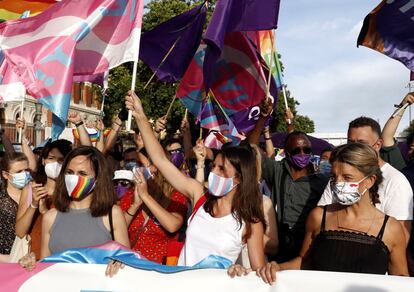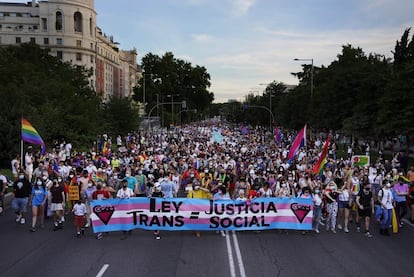Madrid celebrates a toned-down 2021 Pride march but without losing the intensity
Attendance was limited and floats banned due to Covid-19 measures, but participants were defiant of far-right parties’ hate speech and hopeful about a new trans law that could soon be a reality

This year’s Madrid Pride march, held on Saturday, was atypical in many ways. Because of coronavirus restrictions there were none of the usual iconic floats, and attendance was limited to 25,000 people who had previously registered and specified whether they were coming alone, with a partner or as part of a group.
“Come on guys, let’s all put on our face masks and raise our hands up high!” said a DJ into a microphone as a black car moved at a snail’s pace along Paseo del Prado, blaring Beyoncé's Single Ladies from two giant loudspeakers.
It was nevertheless a much-awaited event for the LGBTQ+ community following the year of the pandemic, when all celebrations were canceled. And it came on the back of a new step toward expanded rights for trans people in Spain, where the government recently approved a draft bill that would let individuals choose their gender without medical reports or hormone therapy.
This year’s march also came amid reports of a spike in homophobic acts. There were 312 complaints in 2019, according to the Madrid Homophobia Observatory, indicating nearly one assault a day.

According to the organizations behind the event, this was also the year that Madrid City Hall “did nothing to celebrate Pride, we had to do it all ourselves,” according to Carmen Gil, president of COGAM, Madrid’s LGBTQ+ collective.
Several politicians were seen at the march, including Interior Minister Fernando Grande-Marlaska of the Socialist Party (PSOE) and Madrid Deputy Mayor Begoña Villacís of Ciudadanos (Citizens). But the limelight was on the ministers Ione Belarra (social affairs), Irene Montero (equality) and Yolanda Díaz (labor), all of whom are part of Unidas Podemos, the junior partner in Spain’s coalition government. All three were applauded for their decisive support of the trans bill throughout tricky negotiations with the main governing party, the PSOE.
“We are on the side that we need to be on, on the right side of history,” said Montero at the march. “History is being made after more than 15 years without legislation that respects the rights of trans and LGBTQ+ people.”
Uge Sangil, president of the FELGTB federation, another Pride organizer, said that the community “will not take a single step back in the face of hate speech by the far right and those who rely on [these parties] to be in government.”

Íñigo Errejón, secretary general of the leftist party Más País, noted that the rainbow flag was not on display at Madrid City Hall, where the governing team – a coalition of the Popular Party (PP) and Ciudadanos – fell back on a legal report noting that a June 2020 ruling by the Supreme Court said only official flags can fly from official buildings. Errejón said that “the right-wing parties in Madrid” refused to fly “the flag of freedom” and that this year’s demands by the LGBTQ+ community are common sense issues: “being free, walking without fear, not being marginalized.”
Enrique Gómez, 55, was one of the demonstrators at the march on Saturday. For him, it was the 10th Pride event he had attended. “Last year was very sad for us; I celebrated at home and at least there was some room for demands. But being together on the street like this, it has a whole different meaning.”
The first marches to defend LGBTQ+ rights in Spain date back to the late 1970s. In 1977, between 4,000 and 6,000 people came out on Barcelona’s central thoroughfare of La Rambla, and the following year there were over 7,000 demonstrators in Madrid. The marches have taken place uninterruptedly since then – that is, until the coronavirus pandemic saw all events last year canceled.
English version by Susana Urra.
Tu suscripción se está usando en otro dispositivo
¿Quieres añadir otro usuario a tu suscripción?
Si continúas leyendo en este dispositivo, no se podrá leer en el otro.
FlechaTu suscripción se está usando en otro dispositivo y solo puedes acceder a EL PAÍS desde un dispositivo a la vez.
Si quieres compartir tu cuenta, cambia tu suscripción a la modalidad Premium, así podrás añadir otro usuario. Cada uno accederá con su propia cuenta de email, lo que os permitirá personalizar vuestra experiencia en EL PAÍS.
¿Tienes una suscripción de empresa? Accede aquí para contratar más cuentas.
En el caso de no saber quién está usando tu cuenta, te recomendamos cambiar tu contraseña aquí.
Si decides continuar compartiendo tu cuenta, este mensaje se mostrará en tu dispositivo y en el de la otra persona que está usando tu cuenta de forma indefinida, afectando a tu experiencia de lectura. Puedes consultar aquí los términos y condiciones de la suscripción digital.








































